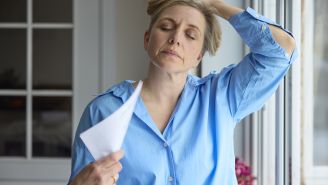7 must-know truths about menopause
It’s not only about hot flashes and sleep issues. This phase of aging is different for everyone.
Updated on June 16, 2023

Menopause is not one single experience. It’s different for everyone, and the symptoms can come and go as you pass through this phase of life.
Menopause occurs when your ovaries stop producing the hormones estrogen and progesterone. You’re technically in menopause when you haven’t had menstrual bleeding for 12 consecutive months. Menopause can bring about a range of emotions, including a sense of relief and freedom. It is also commonly accompanied by symptoms such as hot flashes, vaginal dryness, sleep problems, and changes in your sex drive; there are effective ways to relieve these symptoms.
Here are seven things to know about this important part of aging.

Everyone has a different experience
As with menstruation, each individual can experience menopause at a different time and have different symptoms. The good news is that treatment options are available that may improve your symptoms, although treatments may not work the same way for each person.
“Things have changed drastically when it comes to available treatments,” says Christine Hunter, MD, an OBGYN in Summerville, South Carolina.
While it can be helpful to talk through the ins and outs of the menopause experience with friends and family, just remember that it’s unlikely your experiences will be identical to theirs.

The cause of menopause onset varies
The average age of onset for natural menopause is 52, though it can start years earlier or even a little later. That said, if you undergo surgery that removes the ovaries, such as a total hysterectomy with salpingo-oophorectomy, you may experience menopause earlier. Chemotherapy or radiation to treat certain cancers may damage the ovaries and decrease the production of ovarian hormones, also bringing about early menopause. Other causes of early onset menopause include:
- Smoking
- Certain health conditions like autoimmune diseases (such as rheumatoid arthritis), thyroid disease, HIV/AIDS, or chronic fatigue syndrome
- Chromosomal abnormalities
Although it’s common for early onset menopause to occur with these procedures or health conditions, menopause can also arrive early for no apparent reason.

Perimenopause can bring symptoms, too
Menopause is a consecutive year without a period, but you may experience changes in your period several years before that. This stage is called perimenopause, or menopausal transition.
“Some people may skip a few periods here and there, then have a period, then have three in a row, then skip three months,” Dr. Hunter explains. “During the time they’re not having regular periods, they can have symptoms of menopause.”
Estrogen levels rise and fall irregularly during perimenopause, which can cause your periods to be shorter or longer. You may notice symptoms associated with menopause during this time, such as hot flashes, sleep issues, or vaginal dryness. Heavy or prolonged bleeding may be a sign you’re going through perimenopause, too. Perimenopause occurs at different ages but can start as early as your mid-thirties. On average, it lasts up to four years until you enter menopause.

You can find relief for menopause symptoms
Menopause can bring on symptoms such as night sweats, sleeping problems, vaginal dryness, hair loss, noticeable changes in your mood, and difficulty concentrating. The most common symptom is hot flashes, experienced by up to 80 percent of those going through menopause.
Treatment options are available that can help relieve some of the symptoms. For those who are still having periods or going through perimenopause, low-dose hormonal birth control may help.
Hunter notes that the most common treatment for menopausal symptoms is hormone therapy. “With hormone therapy,” she explains, “you’ll get prescriptions for two or three hormones that are usually produced by the ovaries—estrogen, progesterone, and testosterone.”
Different types of hormone therapy are recommended depending on your health profile. For example, those without a uterus are typically prescribed estrogen only, while those with a uterus usually take estrogen and progestogen.
Although major health organizations including the American College of Obstetricians and Gynecologists (ACOG) and the North American Menopause Society say that hormone therapy is safe for most people, there are some risks. Some types of hormone medications may slightly increase the risk of uterine cancer, breast cancer, heart attack, stroke, or gallbladder disease. “Breast cancer is so prevalent in our society that the risk alone from hormone replacement therapy is small compared to the baseline risk of breast cancer,” Hunter says. If menopause symptoms are affecting your daily life, talk with your healthcare provider (HCP) about what medication may be best for you.
Some HCPs may also recommend herbal remedies such as red clover, dong quai, vitamin E, or black cohosh. “ACOG studies show they’re not necessarily effective, but I think they are worth a try if you don’t want to use typical hormone replacement therapy,” says Hunter. Talk to your HCP before taking any supplements, since some of them may have negative interactions with medications or pose safety concerns for certain people.
There are also “compounded” hormone replacement formulations—customized medications mixed at a pharmacy for a customer’s individual needs. Since these treatments are not regulated by the U.S. Food and Drug Administration, there’s no guarantee of quality control, and there is no solid evidence that compounded hormones work or are safe for long-term use.

Menopause may affect your bone and heart health
Postmenopausal people may have an increased risk for certain health conditions such as osteoporosis and heart disease. This is mainly due to the drop in estrogen, which helps build strong bones. When your ovaries stop producing that hormone, you may experience bone loss.
“Those who are already at risk for bone loss, like people who smoke, have thyroid disease, or are underweight, don’t have as much bone density to start out with, so their risk is higher,” says Hunter. If you’ve gone through menopause, aim to take in 1,200 milligrams of calcium per day. Foods like tofu, low-fat yogurt, milk, leafy green vegetables, and fortified cereals are great sources of calcium. Make sure your diet includes foods with plenty of vitamin D, which your body needs to absorb calcium. People in menopause should consume about 600 to 800 international units (IU) of vitamin D daily. Good sources include fish, milk, and eggs; some people may need to take a supplement.
Postmenopausal people are also at increased risk for heart disease. “As your estrogen levels drop, your risk for heart disease goes up,” says Hunter. Estrogen helps keep blood vessels flexible and encourages proper blood flow. During menopause, it’s also possible that rising blood pressure and LDL (“bad” cholesterol) levels play a role in heart disease risk.
Researchers are working to learn more about the connection between menopause and cardiovascular disease, but in the meantime, a healthy diet and regular exercise can help keep your heart strong. The American Heart Association recommends eating a diet rich in fruits, vegetables, whole grains, low-fat dairy products, fish, lean meat and nuts, and limiting your intake of red meat, sugary foods and drinks. The Mediterranean-style diet may be a good option.

Irregular bleeding should be checked out
Whether or not you’re near the age of menopause onset, irregular bleeding warrants an HCP visit. “Any type of increased bleeding is something that needs to be checked out,” says Hunter.
Monitoring heavy bleeding is especially important if you think you’re going through menopause. “As your hormone levels decrease, your bleeding should decrease,” Hunter says. If your periods are very heavy—they last more than seven days, you soak through one or more tampons or pads per hour, or blood clots in your menstrual flow are bigger than a quarter—see your HCP.
You should also visit your HCP if your period is occurring more than every three weeks. Heavy periods or too-frequent periods may signal an underlying health issue like fibroids (noncancerous growths that develop from uterine tissue), polyps (noncancerous growths that appear on the uterine wall, or endometrial surface), endometriosis (which occurs when cells that line the inside of the uterus grow outside the uterus), or uterine cancers.

This can be a time to appreciate the positives
While menopause may pose some challenges, this period of life can also bring things to look forward to. You can use this time of change to set new goals for the next chapter of your life. One good starting point: Keep a gratitude journal, listing what you are thankful for and what you would like to achieve in the coming days or years.
And remember, it’s important to take care of yourself. While you may not feel your best every day, make sure to set aside time for things that make you feel happy and relaxed. That could mean meeting a friend for a yoga class, winding down at night with a warm bath, or treating yourself to a blowout, just because.
As you are going through these changes, remember to communicate with loved ones. Having a strong social network overall may help you feel better and could even help you live longer.

North American Menopause Society. “Natural Remedies for Hot Flashes.” 2021. Accessed April 20, 2021.
North American Menopause Society. “How Do I Know When I’m in Menopause.” 2021. Accessed April 20, 2021.
National Center for Complementary and Integrative Health. “Menopausal Symptoms: In Depth.” May 2017. Accessed April 20, 2021.
Mayo Clinic. “Perimenopause.” May 7, 2019. Accessed April 20, 2021.
American Heart Association. “Menopause and Heart Disease.” July 31, 2015. Accessed April 20, 2021.
The American College of Obstetricians and Gynecologists. “Heavy Menstrual Bleeding.” April 2019. Accessed April 20, 2021.
HealthyWomen.org. “Heavy Periods.” September 2009. Accessed April 20, 2021.
Office on Women’s Health. “Menopause basics.” March 18, 2019. Accessed April 20, 2021.
UpToDate.com. “Clinical manifestations and diagnosis of menopause.” March 2021. Accessed April 20, 2021.
Office on Women’s Health. “Early or Premature Menopause.” May 22, 2019. Accessed April 20, 2021.
The American College of Obstetricians and Gynecologists. “The Menopause Years.” July 2020. Accessed April 20, 2021.
North American Menopause Society. “Hormone Therapy: Benefits & Risks.” 2021. Accessed April 20, 2021.
UpToDate.com. “Patient education: Calcium and vitamin D for bone health (Beyond the Basics).” March 2021. Accessed April 20, 2021.
The American College of Obstetricians and Gynecologists. “Perimenopausal Bleeding and Bleeding After Menopause.” October 2020. Accessed April 20, 2021.
North American Menopause Society. “Make Your Menopause a Positive Experience.” 2021. Accessed April 20, 2021.
Dan Buettner. “Power 9: Reverse Engineering Longevity.” Blue Zones. 2021. Accessed April 20, 2021.
Mayo Clinic. “Bleeding after menopause: Is it normal?” September 16, 2020. Accessed April 20, 2021.
Edwards M, Can AS. Progestin. [Updated 2023 Mar 11]. In: StatPearls [Internet]. Treasure Island (FL): StatPearls Publishing; 2023 Jan-.
Capozzi A, Scambia G, Lello S. Calcium, vitamin D, vitamin K2, and magnesium supplementation and skeletal health. Maturitas. 2020;140:55-63.
Martínez-González MA, Gea A, Ruiz-Canela M. The Mediterranean Diet and Cardiovascular Health. Circ Res. 2019;124(5):779-798.
More On


video

article

slideshow


video


video
